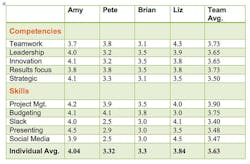Development Goals vs. Performance Goals
In June Greg Minnaar won the World Cup Downhill mountain biking event at Fort William, Scotland. He won it by nearly three seconds on a course where tenths of a second typically determine the victor. A comparatively older gent at 35, he won it on a bike with 29-inch wheels, which are bigger than what’s typically used in this sport.
Both Greg and the new bike he rides are simply more capable machines. Now in his 16th season as a professional, Greg is known for his strength and determination. His training days start at 4 a.m. with a 3 to 4-hour ride, followed by breakfast then an hour in the gym. His new bike was designed and tested through the winter ahead of the other manufacturers who have been caught off guard.
If superior capability and fitness like Minnaar’s are what leads to winning, why do managers choose to mostly focus on reviewing past performance instead of coaching and developing the competencies and skills required for high performance? There are many answers to that question. Chief among them is that developing people takes time, and effective coaching is actually a quite complicated challenge. But the fact remains, if you want a high-performance team, you have to develop highly capable players.
Two Kinds of Goals
If we break the coaching process down, it has these five elements:
- Setting performance goals: to win the championship, to pass the test, to sell more widgets, or just to learn.
- Understanding of the skills and competencies required to succeed: fitness, knowledge, experience and strong work ethic, and so on.
- Conducting a current assessment of those skills and competencies
- Identifying development goals, the strengths to amplify and areas to work on.
- Practice, hard work and more practice and more hard work!
Notice that there are two kinds of goals; performance and development. Think of performance goals as “What you want to achieve,” and development goals as “How you will achieve them.” The key thing to understand is that you will only achieve your performance goals by working on development goals because they create the capability for succeeding.
As intuitive as that sounds, my experience is that development goals are rarely articulated and are almost never reviewed. I asked three top HR leaders, each responsible for organizations larger than 10,000 employees, how many employees have formal development plans, and how many review them regularly with their managers. Their response: Maybe one out of four have a training and development plan, and just one out of 10 review them regularly. Ouch!
How to Write Development Goals
The typical scenario is that an employee and his or her manager are expected to write something about personal development during their annual performance review and goal-setting process. The rushed pro-forma output is weak and, once submitted, is often forgotten until the next review time.
Why do managers choose to mostly focus on reviewing past performance instead of coaching and developing the competencies and skills required for high performance?
—Chris Morgan
One of the reasons that development goals get so little attention is that people don’t know how to write them. I know this both from my experience of helping executives develop more capable teams, and from our efforts at Listentool, the talent development solution. We offer an easy-to-use goals creation guide that walks individuals through a series of questions and produces a draft development plan that can be forwarded on to supervisors. (Create your own personal development guide here.)
Here are some of the questions the tool asks users to consider:
- In your current role, what is one thing you are really good at?
- What are some small steps you can take to demonstrate more of this?
- Over time, how would you like to see your career develop?
- Where would you like to excel in your current role?
- What are some small steps you can take to accomplish this?
- Which organizational competencies would you like to develop further?
- What are some small steps you can take to accomplish this?
Thoughtful answers to these questions will produce a fairly comprehensive development plan that calls out areas for attention and clear action steps to be taken.
Developing the Whole Team
If you manage a team, you have a larger challenge when it comes to setting development goals. One way or another, you are responsible for and dependent on having a stronger bench. You have to go through this process for each team member and for the team as a whole.
Following the coaching steps listed above, think about the capabilities required for your team to succeed, and assess their current level. Here’s a table showing how team members’ desired skills and competencies can be assessed and rolled up to the team level.
Let’s Do It!
This past January the team responsible for building Greg Minnaar’s bike was brainstorming ideas for creating a more capable bike for him. At the same time Greg committed to his new fitness regimen. Six months later they achieved a game-changing World Cup victory.
If you are looking for ways to increase your chances of winning, you might consider drafting your own development goals and running them past your boss for input. If you feel uncertain about how to do that, you can start with the questions above. Nothing ventured, nothing gained, right? And if you are a manager looking for a way to build your bench so that your group can shine, and free you up to make a more strategic contribution, use the development goals and plan to expand your winning capabilities.


